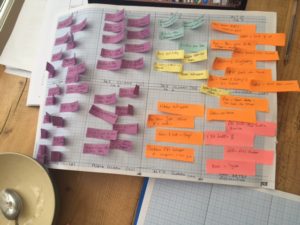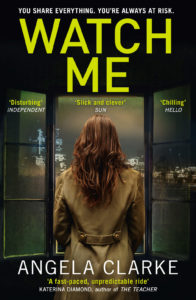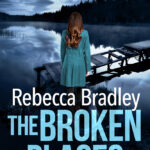I’m excited to introduce Angela Clarke and her revision process Q&A today. I’m a huge fan of Angela’s Social Media Murders, books, so getting an insight into her writing process is a real thrill for me.
You can read her first draft Q&A Here.
 Angela is an author, playwright, columnist and professional speaker. Her debut crime thriller Follow Me (Avon, HarperCollins) was named Amazon’s Rising Star Debut of the Month January 2016, long-listed for the Crime Writer’s Association Dagger in the Library 2016, and short-listed for the Good Reader Page Turner Award 2016. Follow Me has now been optioned by a TV production company. The second instalment in the Social Media Murder Series Watch Me (Avon, HarperCollins) is out now. And the third Trust Me (Avon, HarperCollins) is out June 2017. Angela’s humorous memoir Confessions of a Fashionista (Ebury, Penguin Random House) is an Amazon Fashion Chart bestseller. Her play, The Legacy, enjoyed its first run at The Hope Theatre in June 2015.
Angela is an author, playwright, columnist and professional speaker. Her debut crime thriller Follow Me (Avon, HarperCollins) was named Amazon’s Rising Star Debut of the Month January 2016, long-listed for the Crime Writer’s Association Dagger in the Library 2016, and short-listed for the Good Reader Page Turner Award 2016. Follow Me has now been optioned by a TV production company. The second instalment in the Social Media Murder Series Watch Me (Avon, HarperCollins) is out now. And the third Trust Me (Avon, HarperCollins) is out June 2017. Angela’s humorous memoir Confessions of a Fashionista (Ebury, Penguin Random House) is an Amazon Fashion Chart bestseller. Her play, The Legacy, enjoyed its first run at The Hope Theatre in June 2015.
Angela has given talks, hosted events, and masterclasses for many, including Noirwich Crime Writing Festival, Camp Bestival, Panic! (in partnership with Create, the Barbican, Goldsmiths University and The Guardian), Meet a Mentor (in partnership with the Royal Society of Arts), Northwich Lit Fest, St Albans Lit Fest, BeaconLit, and the London College of Fashion. She also hosted the current affairs radio show Outspoken on Radio Verulam in 2015, and has appeared regularly as a panel guest on BBC 3 Counties, BBC Radio 4, and the BBC World Service, among others.
In 2015 Angela was awarded the Young Stationers’ Prize for achievement and promise in writing and publishing. She also works for The Literary Consultancy critiquing manuscripts and mentoring. Angela, a sufferer of the debilitating chronic condition Ehlers Danlos III, is a Fellow of the Royal Society of Arts, volunteers with Womentoring, Meet a Mentor and at HM Prisons. She is passionate about bringing marginalised voices into the industry. You can find out more about her at www.AngelaClarke.co.uk
Your first draft has been completed, what state is it generally in?
Unreadable by anyone but me! My first draft is me telling myself the story. It’s a brain dump. I don’t even spellcheck it.
What is the first thing do before you start to revise?
Spellcheck it – ha! I usually finish my first draft in quite an intensive time period. My pattern is to work for three hours, then sleep for half an hour. On repeat for the last seventy-two hours of writing the book. So in reality the first thing I do is have a really hot bath and a big sleep. I’m little use without them. When I’ve been keeping normal hours again for a couple of days I pick it back up. It works well, as the short break is like pressing refresh on my mind.
How do you assess the damage that needs working on?
I print out a copy and read it through, making notes with a red pen. Where possible I try to read it all in one go, or at least in two big chunks. I find it’s the best way for me to judge the pacing and rhythm of the manuscript.
Do you allow anyone to read that very first draft before revisions or can you assess it objectively yourself?
Hell no! My reputation as a writer would be ruined if I let anyone near it. Plus they might start to question my state of mind.
What do you initially focus on, when approaching the completed first draft of the manuscript?
I focus on what I call dam busting and bridging. Anywhere where there’s a big block of description, inaction, or filler paragraphs that are blocking the flow of the story I blow them up. Strike through with red pen, and ditch them. Similarly, if there’s a jump in the action – which can happen if you write straight through without editing while you go – I make a note to put a small bridging scene in. I often only end up adding a few sentences, which I think helps keep the pace fast.
Do you have any rituals, writing or real-world, when revising a manuscript?
With each book, I tend to get obsessed with one other creative thing, whether it’s a boxset, or a particular author. When I’m focusing on redrafting I don’t have enough room in my head to watch and read multiple things, but I still need something to unwind to. I pick things, usually in a different genre than crime, and just watch or read those during each book. With Confessions of a Fashionista it was the old BBC Jeeves and Wooster series, with Follow Me it was Gilmore Girls, and with Watch Me it was listening to Elizabeth Gilbert’s Big Magic on Audible. I think I’d listened to it four times in a row by the end of the redraft.
In what format do you revise, paper or computer?
Paper first. Then onto computer (for actualizing those bridging scenes etc.).

How messy is the revision process – can you go in and repair areas or does the whole manuscript get decimated?
I tend to work through the manuscript from start to finish. That way it always feels like I’m moving forward. Albeit sometimes slowly. By the end I hate the story, me, the world and anyone who comes near me. Then I get over myself and send it to my agent. Then I get drunk.
Is revision an overhaul of the story or is it minor editing?
It entirely depends what it needs. I don’t think I have a regular pattern. I guess it’s a bit like giving birth, now I’m thinking back it all seems a bit hazy…
What’s the biggest change you’ve made to a story during this process?
Probably a structural one. A big rejig so everything is in an entirely new order.
When first drafting, many writers keep track of progress by counting words in a day. How do you make sure you’re progressing as you’re revising?
If I haven’t turned to alcohol in desperation by the end of the day, it’s safe to assume I’m still progressing.
Do you prefer to write the first draft or do you prefer the revision process?
First draft, definitely. Though it is pleasing seeing it all start to take shape.
What do you drink while you’re working?
Water. If I’ve hit the wine either the manuscript or me isn’t working.
How long does this process take and what shape is the book now in?
It probably takes longer than I think it’s going to. I always give myself a couple of weeks. In reality, with the bridging bits written and inserted, it’s probably closer to four to six weeks. (Though that does include another read through and tighten).
You can get a FREE copy of Hewn Stones, and insider tips on publishing from top agent Diana Beaumont by signing up for Angela’s Pen Knife Club here: http://angelaclarke.co.uk/free/
Catch up with Follow Me | Watch Me |Twitter
Watch Me
 YOU HAVE SIX SECONDS TO READ THIS MESSAGE…
YOU HAVE SIX SECONDS TO READ THIS MESSAGE…
The body of a 15-year-old is found hours after she sends a desperate message to her friends. It looks like suicide, until a second girl disappears.
This time, the message is sent directly to the Metropolitan Police – and an officer’s younger sister is missing.
DS Nasreen Cudmore and journalist Freddie Venton will stop at nothing to find her. But whoever’s behind the notes is playing a deadly game of hide and seek – and the clock is ticking.
YOU HAVE 24 HOURS TO SAVE THE GIRL’S LIFE.
MAKE THEM COUNT.



Blow them up – I like it.
That is one intense writing schedule.
I’m learning so much from the way other authors go about the revision process. And I admire the author who can completely restructure a story, top to bottom, in the revision process!
It’s nice to read about someone else who has a messy first draft to work from. I was starting to think I’m the only one 🙂